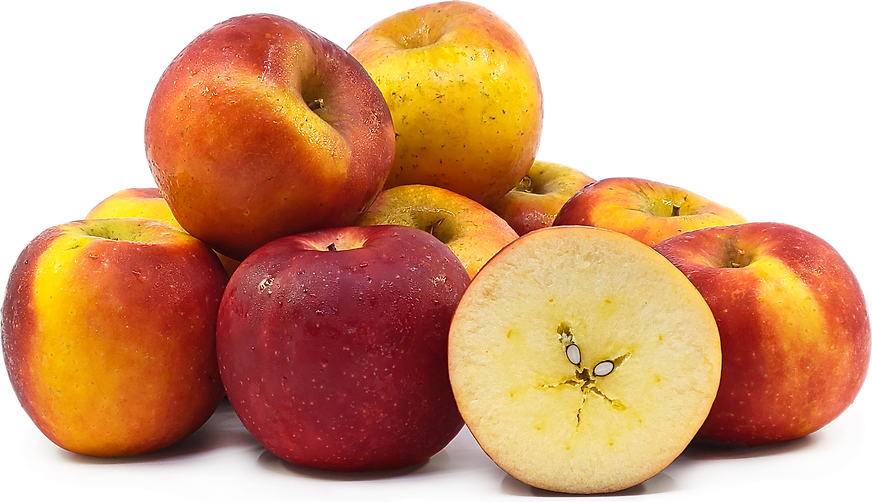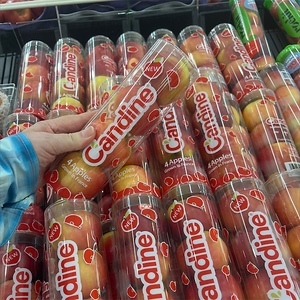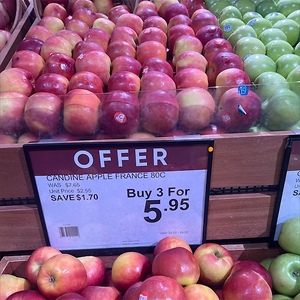


Candine® Apples
Estimated Inventory, lb : 0
Description/Taste
Candine® apples are a medium to large varietal, averaging 7 to 8.5 centimeters in diameter, and have a round to obolid, slightly flattened shape. The apple's skin is semi-thick, smooth, glossy, and taut, showcasing a golden yellow base enveloped in a dark red-orange blush. The pigmented blush will vary per apple, and the surface is also covered in pale grey-brown lenticels. Underneath the skin, the yellow flesh is firm, dense, and aqueous, with a crisp and crunchy consistency. The flesh also encases a sizeable central core filled with tiny dark brown seeds. Candine® apples release a prominent aroma when ripe and have a high sugar content ranging from 14 to 17 Brix. This high sugar content mixed with moderate acidity creates a refreshing, balanced, sweet, tangy, and subtly fruity flavor.
Seasons/Availability
Candine® apples are grown in the southern and northern hemispheres, providing year-round availability in select commercial markets.
Current Facts
Candine® apples, botanically classified as Malus domestica, are a modern French variety belonging to the Rosaceae family. The bi-colored apples are a type of club apple designed by breeders to exhibit improved cultivation characteristics to create a balanced apple for the fresh eating sector. Candine® apples are considered one of the sweetest cultivars sold in commercial markets worldwide, and the variety is grown using conventional and organic methods. Growers favor Candine® apples for their brightly colored nature, sweet taste, resistance to spotting and scab, and extended storage capabilities. Candine® apples are also known by their original varietal name, RegalYou apples, and the variety was released in the 21st century. Since their debut, Candine® apples have expanded production outside of France, and the apples are grown around the world, sold as a dessert variety typically consumed fresh.
Nutritional Value
Candine® apples, like other apple varieties, are a source of fiber to regulate the digestive tract, potassium to balance fluid levels within the body, and vitamin C to strengthen the immune system while reducing inflammation. The apples also provide copper to develop connective tissues, vitamin K to assist in faster wound healing, antioxidants to protect the cells against the damage caused by free radicals, and other nutrients, including vitamin E, magnesium, iron, zinc, manganese, and phosphorus.
Applications
Candine® apples have a sweet, subtly fruity flavor suited for fresh preparations. The variety is mainly promoted as a dessert apple, popularly consumed straight out of hand. Candine® apples can also be chopped and tossed into salads, mixed into fruit medleys, sliced and layered over toast, or used as a fresh topping over breakfast dishes such as overnight oats, waffles, parfaits, and granola. For a sweet snack, try slicing and dipping Candine® apples in nut butter, melted chocolate, or caramel. The variety can also be added to sandwiches for extra crunch, chopped into stuffings, or minced and added into dips and spreads. Beyond fresh preparations, Candine® apples can be blended into smoothies, pressed into juices, or stirred into sparkling beverages. Candine® apples pair well with maple syrup, vanilla, chocolate, nuts such as almonds, walnuts, and pistachios, and spices including cinnamon, cloves, nutmeg, and ginger. Whole, unwashed Candine® apples will keep for 1 to 2 months when stored in the refrigerator's crisper drawer. In professional storage, the variety can be stored for 4 to 10 months.
Ethnic/Cultural Info
Candine® apples earned their brand name from the variety's sweet, fruity flavor. It is said the word "Candine" sounds similar to "candied" in English, French, and Italian and exemplifies the apple's high sugar and low acid content. Besides their sweet moniker, Candine® apples were re-marketed in 2022 to appeal to a younger audience. Blue Whale Fruit, the exclusive marketer of Candine® apples in France, discovered that the average demographic for consuming apples was mostly above 50 years of age. The company decided to shift brand messaging to appeal to a younger audience by highlighting the variety as a healthy, fun, and quick snack. Blue Whale also created new digital marketing campaigns, advertising Candine® apples as a fruit to "transport your mind to your happiest moments and experiences in life." This "memory-inducing" campaign is meant to convey that Candine® apples were created using natural breeding methods and at the core of eating this variety is a quality flavor experience.
Geography/History
Candine® apples are native to France and were developed by well-known apple and stone fruit breeder Arsene Maillard in his company's experimental orchard near Elne, Pyrénées Orientales, France. Maillard co-owned Agro Selections Fruits with his wife, Laurence Maillard, a company established in 1996 that focused on developing new fruit varieties with improved cultivation characteristics. Candine® apples were created from a cross between RakuRaku apples, a popular strain of Fuji apples widely planted in Europe, and Ariane apples, a modern French variety. The cultivar was developed using traditional breeding methods, and it took over ten years before it was considered for commercial release. The original varietal name for the variety is RegalYou, sometimes written as REGALYOU apples, and the cultivar was registered in the Official Catalogue of the Agricultural Ministry of the French Republic in November 2011. RegalYou apples were also granted a United States Plant Patent in 2015 under the number US PP #20130263334P1, and the patent is active until 2033. In 2018, the Maillard's sold Agro Selections Fruits to Frutaria, the agricultural division of the SAMCA Group in Spain. Agro Selections Fruits, operating under Frutaria, officially released RegalYou apples under the brand name Candine® to the produce industry at the Fruit Attraction Show in Madrid, Spain, in 2018. After its release, Candine® apples were given to select marketing organizations to promote the fruits in various regions worldwide. Currently, Candine® apples are marketed by Blue Whale Produce in France, Apofruit in Italy, Maca de Alcobaca in Portugal, and Girpoma in Spain. Candine® apples were exported to markets outside of Europe beginning in 2019, and the variety has become a leading modern cultivar in Asian markets. The apples are also shipped to South America and the Middle East. Today Candine® apples have expanded in cultivation and are produced worldwide for year-round availability, sold through select retailers and distributors.










